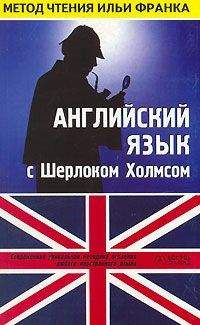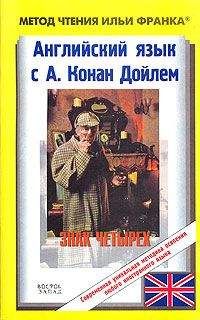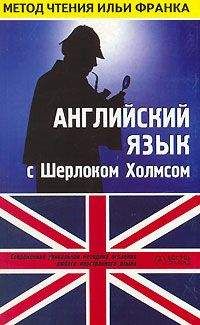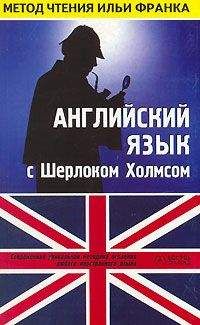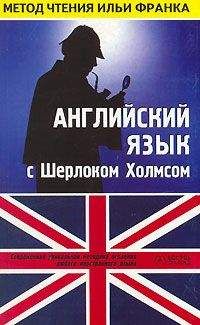certainly [ˈsǝ:t(ǝ)nlɪ], thought [Ɵɔ:t], prefer [prɪˈfǝ:]
“‘Tell me, dad,’ said she, looking, I thought, a little disturbed, ‘did you give Lucy, the maid, leave to go out to-night?’
“‘Certainly not.’
“‘She came in just now by the back door. I have no doubt that she has only been to the side gate to see someone, but I think that it is hardly safe and should be stopped.’
“‘You must speak to her in the morning, or I will if you prefer it. Are you sure that everything is fastened?’
“‘Quite sure, dad.’
“‘Then, good-night.’
I kissed her and went up to my bedroom again, where I was soon asleep.
“I am endeavoring to tell you everything, Mr. Holmes (я стараюсь рассказывать вам все, мистер Холмс), which may have any bearing upon the case (что может иметь хоть какое-нибудь отношение к делу), but I beg that you will question me upon any point (но, прошу вас, уточняйте любые моменты) which I do not make clear (которые я излагаю неясно; to make clear — прояснять, выяснять).”
“On the contrary, your statement is singularly lucid (напротив, ваш рассказ необыкновенно четкий/ясный; statement — заявление, утверждение; изложение, формулировка; отчет; дача показаний; to state — заявлять, утверждать; констатировать).”
“I come to a part of my story now in which I should wish to be particularly so (теперь я перехожу к той части моего рассказа, в которой я хотел бы быть особенно ясным). I am not a very heavy sleeper (я не очень крепко сплю), and the anxiety in my mind tended, no doubt (и беспокойство норовило, несомненно; to tend — иметь тенденцию /к чему-либо/; клониться, склоняться /к чему-л./), to make me even less so than usual (сделать меня даже менее крепко спящим, чем обычно). About two in the morning, then, I was awakened by some sound in the house (около двух утра я был разбужен каким-то шумом в доме). It had ceased ere I was wide awake (он прекратился прежде, чем я окончательно проснулся; wide awake — бодрствующий; совсем проснувшись, вполне очнувшись от сна), but it had left an impression behind it (но у меня осталось впечатление) as though a window had gently closed somewhere (будто где-то осторожно закрыли окно). I lay listening with all my ears (я лежал и напряженно прислушивался). Suddenly, to my horror, there was a distinct sound of footsteps (вдруг, к своему ужасу, я услышал отчетливый звук шагов) moving softly in the next room (/человека/, мягко ступавшего в соседней комнате). I slipped out of bed, all palpitating with fear (я выскользнул из постели, дрожа от страха), and peeped round the corner of my dressing-room door (и заглянул за угол двери = выглянул из-за двери гардеробной).
“‘Arthur!’ I screamed (закричал я), ‘you villain! you thief (негодяй! вор)! How dare you touch that coronet (как ты смеешь трогать диадему)?’
lucid [ˈlu:sɪd], anxiety [æŋˈzaɪǝtɪ], listening [ˈlɪs(ǝ)nɪŋ], distinct [dɪsˈtɪŋ(k)t], touch [tʌʧ]
“I am endeavoring to tell you everything, Mr. Holmes, which may have any bearing upon the case, but I beg that you will question me upon any point which I do not make clear.”
“On the contrary, your statement is singularly lucid.”
“I come to a part of my story now in which I should wish to be particularly so. I am not a very heavy sleeper, and the anxiety in my mind tended, no doubt, to make me even less so than usual. About two in the morning, then, I was awakened by some sound in the house. It had ceased ere I was wide awake, but it had left an impression behind it as though a window had gently closed somewhere. I lay listening with all my ears. Suddenly, to my horror, there was a distinct sound of footsteps moving softly in the next room. I slipped out of bed, all palpitating with fear, and peeped round the corner of my dressing-room door.
“‘Arthur!’ I screamed, ‘you villain! you thief! How dare you touch that coronet?’
“The gas was half up, as I had left it (газ был включен наполовину, как я его и оставил), and my unhappy boy, dressed only in his shirt and trousers (и мой злополучный мальчик, одетый только в рубашку и брюки), was standing beside the light, holding the coronet in his hands (стоял около горелки, держа в руках диадему). He appeared to be wrenching at it, or bending it with all his strength (мне показалось, он изо всех сил то ли дергал ее, то ли старался согнуть; to wrench — дергать; вывертывать, выкручивать). At my cry he dropped it from his grasp and turned as pale as death (при моем крике он выронил ее и стал бледен как смерть; to turn — поворачивать, переворачивать; делаться, становиться, превращаться). I snatched it up and examined it (я схватил диадему и осмотрел). One of the gold corners, with three of the beryls in it, was missing (не хватало одного золотого зубца с тремя бериллами).
“‘You blackguard (ах ты мерзавец)!’ I shouted, beside myself with rage (крикнул я вне себя от ярости). ‘You have destroyed it (ты сломал ее)! You have dishonored me forever (ты опозорил меня навсегда)! Where are the jewels which you have stolen (где камни, которые ты украл; to steal-stole-stolen)?’
“‘Stolen (украл)!’ he cried.
“‘Yes, thief (да, вор)!’ I roared, shaking him by the shoulder (закричал я, тряся его за плечи).
“‘There are none missing (ничего не пропало/все на месте). There cannot be any missing (не может быть, чтобы чего-то недоставало),’ said he.
half [hɑ:f], wrenching [ˈrenʧɪŋ], shouted [ˈʃautɪd]
“The gas was half up, as I had left it, and my unhappy boy, dressed only in his shirt and trousers, was standing beside the light, holding the coronet in his hands. He appeared to be wrenching at it, or bending it with all his strength. At my cry he dropped it from his grasp and turned as pale as death. I snatched it up and examined it. One of the gold corners, with three of the beryls in it, was missing.
“‘You blackguard!’ I shouted, beside myself with rage. ‘You have destroyed it! You have dishonored me forever! Where are the jewels which you have stolen?’
“‘Stolen!’ he cried.
“‘Yes, thief!’ I roared, shaking him by the shoulder.
“‘There are none missing. There cannot be any missing,’ said he.
“‘There are three missing (не хватает трех /камней/). And you know where they are (и ты знаешь, где они). Must I call you a liar as well as a thief (ты, оказывается, не только вор, но и лжец)? Did I not see you trying to tear off another piece (я сам видел, как ты пытался оторвать еще один зубец)?’
“‘You have called me names enough (хватит оскорблений; to call names — оскорблять, обзывать /кого-либо/),’ said he, ‘I will not stand it any longer (я больше не буду их терпеть). I shall not say another word about this business (я больше ни слова не скажу об этом), since you have chosen to insult me (раз ты решил меня оскорблять; to choose-chose-chosen). I will leave your house in the morning (завтра я уйду из дома) and make my own way in the world (и сам буду устраиваться в жизни; to make one's way in the world — делать карьеру, завоевывать положение в обществе).’
“‘You shall leave it in the hands of the police (ты уйдешь отсюда только в сопровождении полиции: «в руках полиции»)!’ I cried half-mad with grief and rage (я кричал, обезумев от горя и гнева). ‘I shall have this matter probed to the bottom (я постараюсь /сделать так/, чтобы в этом разобрались до основания; to probe — зондировать; прощупывать; расследовать, исследовать).’
“‘You shall learn nothing from me (от меня ты ничего не узнаешь),’ said he with a passion such as I should not have thought was in his nature (сказал Артур с такой яростью, которой я не ожидал от его характера). ‘If you choose to call the police (если хочешь вызвать полицию), let the police find what they can (/пожалуйста/, пусть ищут).’
insult [ɪnˈsʌlt], police [pǝˈli:s], passion [ˈpæʃ(ǝ)n]
“‘There are three missing. And you know where they are. Must I call you a liar as well as a thief? Did I not see you trying to tear off another piece?’
“‘You have called me names enough,’ said he, ‘I will not stand it any longer. I shall not say another word about this business, since you have chosen to insult me. I will leave your house in the morning and make my own way in the world.’
“‘You shall leave it in the hands of the police!’ I cried half-mad with grief and rage. ‘I shall have this matter probed to the bottom.’
“‘You shall learn nothing from me,’ said he with a passion such as I should not have thought was in his nature. ‘If you choose to call the police, let the police find what they can.’
“By this time the whole house was astir (к этому времени весь дом поднялся на ноги; astir — находящийся в движении; взволнованный, возбужденный; на ногах, вставший с постели; to stir — шевелить/ся/; двигать/ся/), for I had raised my voice in my anger (так как я кричал в гневе; to raise one's voice — повышать голос). Mary was the first to rush into my room (Мэри первой вбежала в мою комнату), and, at the sight of the coronet and of Arthur’s face (и при виде диадемы и лица Артура), she read the whole story (она все поняла: «прочла всю историю») and, with a scream, fell down senseless on the ground (и, вскрикнув, упала на пол без чувств; scream — крик; senseless — бесчувственный, без чувств). I sent the house-maid for the police (я послал горничную за полицией) and put the investigation into their hands at once (и сразу же передал дело в руки полицейских). When the inspector and a constable entered the house (когда инспектор и констебль вошли в дом), Arthur, who had stood sullenly with his arms folded (Артур, мрачно стоявший со скрещенными руками), asked me whether it was my intention to charge him with theft (спросил меня, /действительно/ ли я намереваюсь предъявить ему обвинение в воровстве). I answered that it had ceased to be a private matter (я ответил, что это перестало быть личным делом), but had become a public one (и стало общественным), since the ruined coronet was national property (поскольку сломанная диадема является государственной собственностью). I was determined that the law should have its way in everything (я твердо решил, что /делу/ нужно дать законный оборот: «закон должен присутствовать во всем»).
“‘At least (по крайней мере),’ said he, ‘you will not have me arrested at once (ты не дашь арестовать меня сейчас же). It would be to your advantage as well as mine (это было бы для твоей пользы, а также для моей) if I might leave the house for five minutes (если бы я смог выйти из дома на пять минут).’
constable [ˈkʌnstǝb(ǝ)l], answered [ˈɑ:nsǝd], ruined [ˈru:ɪnd]
“By this time the whole house was astir, for I had raised my voice in my anger. Mary was the first to rush into my room, and, at the sight of the coronet and of Arthur’s face, she read the whole story and, with a scream, fell down senseless on the ground. I sent the house-maid for the police and put the investigation into their hands at once. When the inspector and a constable entered the house, Arthur, who had stood sullenly with his arms folded, asked me whether it was my intention to charge him with theft. I answered that it had ceased to be a private matter, but had become a public one, since the ruined coronet was national property. I was determined that the law should have its way in everything.
